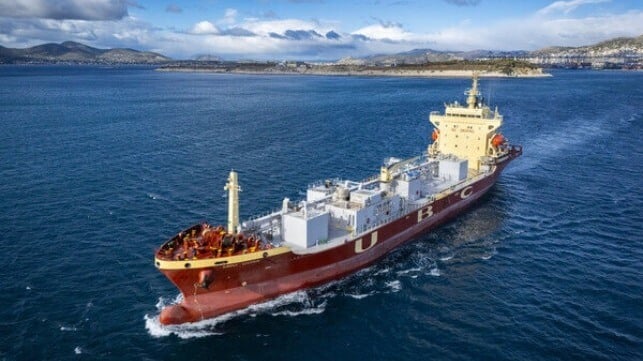Seabound Lands a Novel Carbon-Capture Partnership With a Cement Plant

Working with German owner Hartmann Group, shipmanager InterMaritime and construction materials giant Heidelberg, the UK-based startup Seabound has launched a unique onboard carbon capture venture that starts with Bunker C and ends up in cement.
Seabound's carbon capture system captures up to 95% of CO? (variable, depending upon the customer's needs) and 98% of sulfur emissions from ship exhaust. The sulfur-removal capability means that it is compatible with HFO fuel, a cost savings over VLSFO. Its process uses slaked lime - calcium hydroxide, one of the world's most common chemical ingredients - to absorb CO? and convert it into limestone (calcium carbonate). The resulting product is stored on board the ship, then offloaded in port.
Since limestone is the main feedstock for cement plants, Seabound's technology lines up well with nascent efforts to decarbonize the concrete manufacturing sector. Heidelberg Materials' Brevik plant is one-of-a-kind in this segment: it is the first full-size facility designed to produce carbon-captured cement, the key ingredient in net-zero concrete.
Under the new partnership with Hartmann Group, InterMaritime Group and Heidelberg Materials Northern Europe, Seabound will install its system aboard the cement carrier UBC Cork, which serves the Brevik plant. The captured carbon - in limestone form - will be offloaded when the ship calls at Brevik and will be run through the cement plant. This means that the carbon in UBC Cork's fuel will be captured twice - once on the ship, when it is turned to limestone, and once again when that limestone is turned to cement. Along with the Brevik cement plant's other captured CO2, it will be injected into a subsea reservoir run by the Shell/Equinor/TotalEnergies Northern Lights project, due to start operations later this year.
"We're proud to partner with industry leaders like Heidelberg Materials and Hartmann to deliver scalable carbon capture solutions," said Alisha Fredriksson, CEO and Co-founder of Seabound. "We're especially excited to be advancing this work in Brevik, a strategic location that's rapidly establishing itself as a global hub for CCS."
